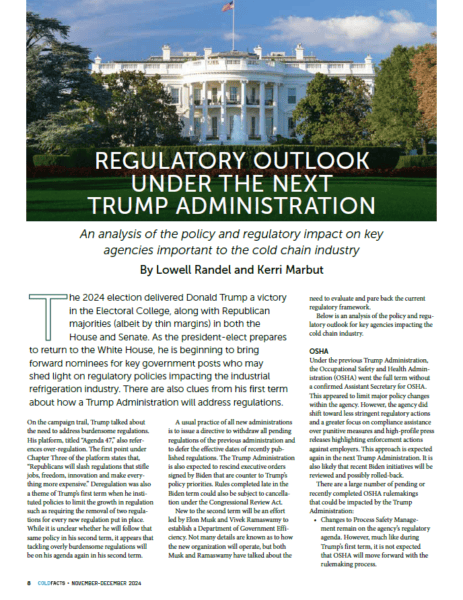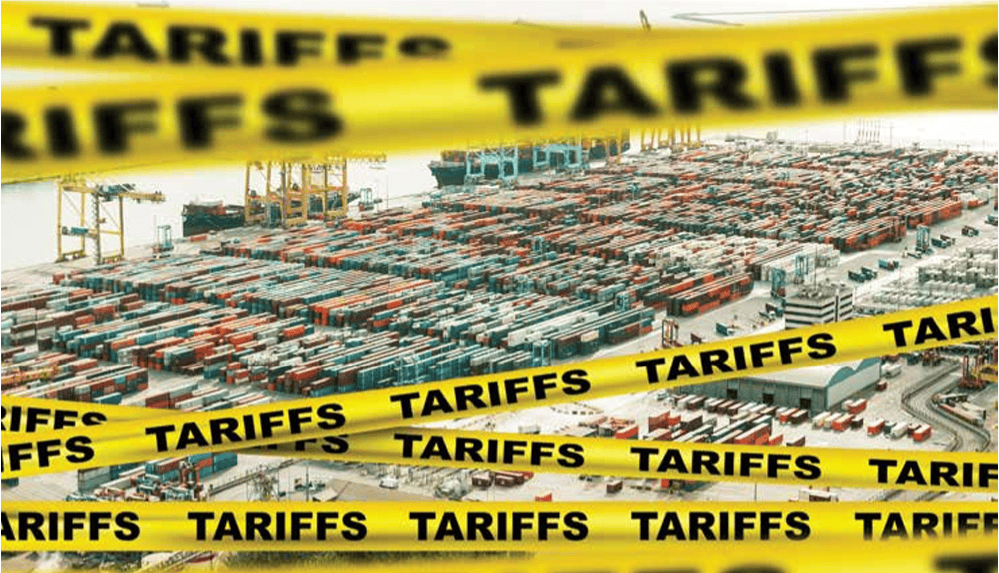From COLD FACTS Magazine (Click Image)
Read Below:
Regulatory Outlook Under the Next Trump Administration
An analysis of the policy and regulatory impact on key agencies important to the cold chain industry
By Lowell Randel and Kerri Marbut
The 2024 election delivered Donald Trump a victory in the Electoral College, along with Republican majorities (albeit by thin margins) in both the House and Senate. As the president-elect prepares to return to the White House, he is beginning to bring forward nominees for key government posts who may shed light on regulatory policies impacting the industrial refrigeration industry. There are also clues from his first term about how a Trump Administration will address regulations.
On the campaign trail, Trump talked about the need to address burdensome regulations. His platform, titled “Agenda 47,” also references over-regulation. The first point under Chapter Three of the platform states that, “Republicans will slash regulations that stifle jobs, freedom, innovation and make everything more expensive.” Deregulation was also a theme of Trump’s first term when he instituted policies to limit the growth in regulation such as requiring the removal of two regulations for every new regulation put in place. While it is unclear whether he will follow that same policy in his second term, it appears that tackling overly burdensome regulations will be on his agenda again in his second term.
A usual practice of all new administrations is to issue a directive to withdraw all pending regulations of the previous administration and to defer the effective dates of recently published regulations. The Trump Administration is also expected to rescind executive orders signed by Biden that are counter to Trump’s policy priorities. Rules completed late in the Biden term could also be subject to cancellation under the Congressional Review Act.
New to the second term will be an effort led by Elon Musk and Vivek Ramaswamy to establish a Department of Government Efficiency. Not many details are known as to how the new organization will operate, but both Musk and Ramaswamy have talked about the need to evaluate and pare back the current regulatory framework.
Below is an analysis of the policy and regulatory outlook for key agencies impacting the cold chain industry.
OSHA
Under the previous Trump Administration, the Occupational Safety and Health Administration (OSHA) went the full term without a confirmed Assistant Secretary for OSHA. This appeared to limit major policy changes within the agency. However, the agency did shift toward less stringent regulatory actions and a greater focus on compliance assistance over punitive measures and high-profile press releases highlighting enforcement actions against employers. This approach is expected again in the next Trump Administration. It is also likely that recent Biden initiatives will be reviewed and possibly rolled-back.
There are a large number of pending or recently completed OSHA rulemakings that could be impacted by the Trump Administration:
Changes to Process Safety Management remain on the agency’s regulatory agenda. However, much like during Trump’s first term, it is not expected that OSHA will move forward with the rulemaking process.
President Trump may reconsider OSHA’s “Worker Walkaround Representative Designation Process” rule, which allows some third-party representatives in inspections. The rule is also being challenged in the courts.
The proposed “Heat Injury and Illness Prevention” rule, which has yet to be finalized, is not likely to move forward in its current form and could be scrapped in favor of guidance instead of regulation.
The proposed “Emergency Response Standard” is still in the rulemaking process and could be shelved by the new administration, particularly given concerns about the rule’s clarity and potential burden.
The “Improve Tracking of Workplace Injuries and Illnesses” rule could also be revisited. The policy exemplifies regulatory shifts across recent administrations, impacting consistency in reporting requirements for employers and OSHA’s policy direction.
Enforcement will continue as the new administration takes shape, but priorities will shift at the federal level. In response to some of these rollbacks and shifting priorities on the federal level, some states like California may intensify their enforcement efforts.
EPA
Trump has selected former Rep. Lee Zeldin from New York to lead the Environmental Protection Agency (EPA). Zeldin has indicated that deregulation will be a top priority for him as EPA Administrator. A substantial shift in the EPA’s focus is expected, marked by decentralized regulatory power at the federal level, a pivot toward fossil fuels, and fewer initiatives focused on climate change and environmental justice. This approach could reduce regulatory costs for businesses and influence international efforts aimed at reducing global emissions. In the previous Trump Administration, the United States pulled out of the Paris Climate Agreement and there is potential to see similar withdrawals from international climate negotiations and commitments.
The Trump administration previously sought to reduce the EPA’s budget by up to 30%, although Congress ultimately approved fewer cuts. Trump also froze hiring and aimed to reduce staff levels. Similar efforts are expected in his second term.
In his first term, Trump moved to reconsider Risk Management Program (RMP) changes finalized by the Obama Administration. It is possible that history will repeat itself with the recent RMP changes instituted by the Biden Administration. The latest RMP Rule, “Safer Communities by Chemical Accident Prevention,” was finalized in February 2024, but the compliance date for most provisions is not until 2027. The new EPA leadership could consider additional rulemaking to revise or rescind the Biden-era RMP rule.
While it is widely expected that many climate policies will be rolled back under the Trump Administration, it is not clear how that will impact regulations under the American Innovation & Manufacturing (AIM) Act. The AIM Act passed with bipartisan support and also has support from industry. These factors may keep AIM Act policies off the list of high priority roll backs.
USDA
Trump has selected Brooke Rollins as his nominee for Secretary of Agriculture. Rollins is a native of Texas who grew up on a farm and was active in 4-H and Future Farmers of America (FFA). She has a degree in Agricultural Development from Texas A&M University. Rollins served in the first Trump Administration as Director of the Domestic Policy Council in the White House.
If confirmed, Rollins will be faced with a number of challenges and opportunities early in her tenure. With Congress unable to complete a Farm Bill this year, negotiations will be pushed to 2025. In addition, changes to trade policy could have a significant impact on food and agriculture. Trump has indicated his desire to institute additional tariffs on imported products to boost U.S. production and manufacturing.
When countries retaliate on tariffs to their products, U.S. food and agriculture is a usual target. This could impact export opportunities for some commodities. This was the case with tariffs during Trump’s first term, which triggered the administration to establish programs like the Market Facilitation Program to assist producers impacted by tariff retaliation. It is also expected that United States Department of Agriculture (USDA) will see a focus on deregulation and reduced emphasis on climate related programs.
FDA
Dr. Marty Makary has been announced as Trump’s selection to lead the Food and Drug Administration (FDA). Makary is a medical doctor with limited experience in the food space, similar to most previous leaders of the agency. Under a second Trump presidency, key personnel changes could bring a more hands-off approach to regulation, as seen in previous years, with the possibility of rolling back certain rules or focusing on deregulation to reduce what is viewed as bureaucratic overreach.
Implementation of the FSMA 204 Rule on food traceability could be impacted by the new administration. The current compliance date for the rule is January 2026. However, industry (including GCCA) has been pushing both FDA and Congress to delay the compliance deadline and conduct pilot programs to evaluate compliance strategies for various parts of the food supply chain.
Trump has announced that he will nominate Robert F. Kennedy, Jr. (RFK Jr.) to serve as his Secretary of the Department of Health and Human Services (HHS). FDA falls under the HHS structure and RFK Jr. has indicated plans to address both food and drug policies under his “Make America Healthy Again” efforts. This could have implications for food industry practices including the use of certain chemicals and ingredients in food production.
Transportation
Sean Duffy, former congressman from Wisconsin, has been nominated for Transportation Secretary. The transportation industry can expect a continued focus on deregulation. In the trucking sector, there may be a rollback of certain environmental regulations, such as stricter emissions standards and electric vehicle mandates, which could reduce compliance costs for trucking companies.
Similarly, Trump may look to roll back rail regulations advanced by the Biden Administration. Additionally, Trump’s tariff policies could encourage nearshoring and increase demand for domestic freight.
Trade
Jamieson Greer, who served as Chief of Staff for the United States Trade Representative (USTR) during the first Trump Administration, has been tapped for the role of Trade Representative.
Trump has been clear about his intentions to explore additional tariffs on foreign goods and promote domestic production. This could strain relationships with some trading partners and result in retaliatory tariffs or other actions against U.S. goods. In his first term, Trump seemed to prefer bilateral trade agreements to multilateral accords. However, Trump did support the renegotiation of NAFTA, which became the U.S., Mexico and Canada Trade Agreement (USMCA). USMCA is scheduled to undergo a review in 2026, and each of the countries is preparing for domestic consultations to evaluate how USMCA is operating. Trump has already indicated his intention to utilize the six-year renegotiating provision under USMCA to revise the agreement.
Tax
One of Trump’s signature accomplishments during his first term was the Tax Cuts and Jobs Act (TCJA). Many provisions of the law are set to expire at the end of 2025. Extension of the core tax policies of the TCJA is expected to be a high priority for Trump and the Republican-led Congress in 2025. In addition, Trump has proposed other tax policies such as further lowering the corporate rate to 15% and not taxing tips or overtime.
In terms of international tax policies, Trump has expressed a commitment to reshoring, potentially implementing tax credits and deductions to incentivize U.S.- based production, particularly for critical industries. His administration might also revisit global minimum tax policies, which have been under discussion internationally, as he has previously expressed reservations about international agreements that could limit U.S. tax autonomy.
Border Security and Immigration
Border security and immigration were prominent in Trump’s campaign messaging. He has tapped the former Immigration and Customs Enforcement Director, Tom Homan, to be in charge of border policy, and there are plans to conduct deportations of undocumented migrants and complete the border wall. Concerns have been expressed over the potential impact deportations will have on the availability of farm labor.
As the transition to the new Trump Administration continues, GCCA will be closely monitoring developments, engaging with policy makers and advocating for policies beneficial to the cold chain.




